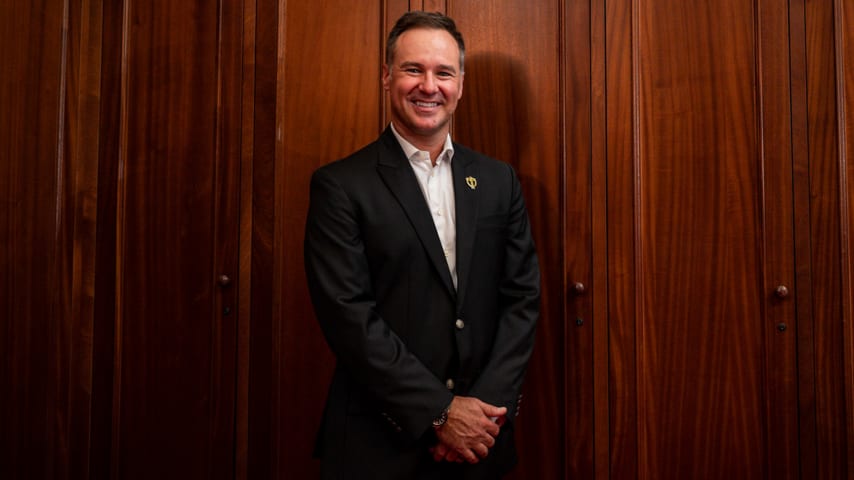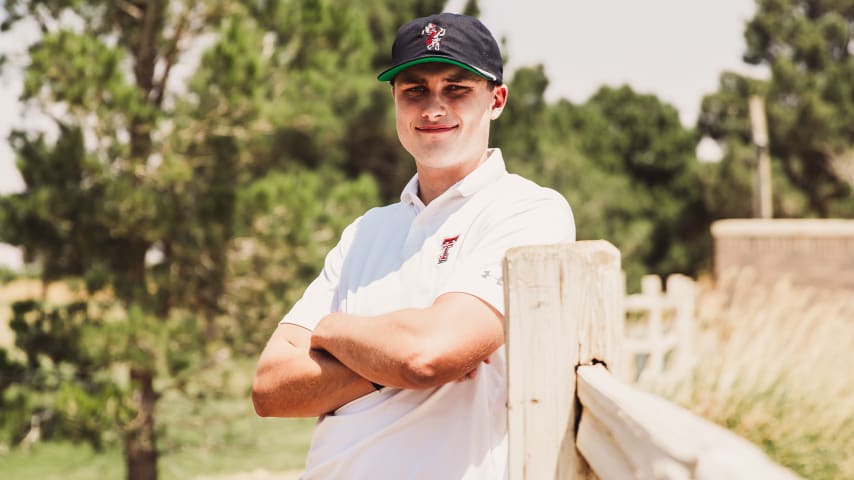‘I don’t have a problem telling the truth’
13 Min Read

Before his debut as CBS’ lead analyst, Immelman talks everything from Tom Kim to Tiger Woods and his aims as an announcer
Written by Sean Martin
Before his debut as CBS’ lead analyst, Immelman talks everything from Tom Kim to Tiger Woods and his aims as an announcer
Trevor Immelman didn’t always see a broadcast career in his future. He thought he’d still be playing professionally at 43 years old.
But the former Masters champion found his way to booth after injuries and struggles brought his playing career to a premature end. Now, a year after leading the International Team at the Presidents Cup, Immelman is ready for another new role.
This week’s Farmers Insurance Open will mark Immelman’s debut as CBS Sports’ lead golf analyst, putting him in the booth alongside Jim Nantz after Nick Faldo’s retirement. Ian Baker-Finch and Frank Nobilo round out the four-man team in what the network is terming a “Super Tower.”
Immelman sat down with PGATOUR.COM in December for an extended Q&A to discuss his career, his goals as a broadcaster, handling Twitter and also his predictions for players like Rory McIlroy, Tiger Woods and Collin Morikawa.
Immelman won twice on TOUR – Woods was runner-up in his triumphs at the 2006 Western Open and 2008 Masters – but the one-time amateur phenom (he was runner-up in the 1997 British Amateur and U.S. Junior and won the following year’s U.S. Amateur Public Links at Torrey Pines) ceased competing professionally before turning 40.
“I have a great understanding of what it takes to win at the highest level but also an understanding of what it can be like to feel lost with your game,” Immelman said. “The goal for me really is to always be honest.”
Read below for more from CBS’ new lead analyst (Note: Interview has been edited for brevity and clarity).
Q. What excites you most about the new role?
TREVOR IMMELMAN: Oh, there's a number of things, but really to be sitting next to Jim Nantz is pretty cool. I obviously grew up listening to him as the voice of golf, really. The first Masters I watched on TV was 1986, and that was his first one when he was in the 16th tower calling that shot of Jack's when he hit that iron shot close there at 16. … It’s pretty much the guy that I've listened to throughout my years, so quite surreal now for me to be sitting next to him calling the golf. That's pretty exciting.
Q. What has been the biggest learning curve in getting into the broadcast booth?
TREVOR IMMELMAN: Biggest learning curve is just understanding the flow of traffic, so to speak, and being able to multitask from the standpoint of taking instructions from the producer whilst talking, taking instructions from the producer whilst listening to the people that you're working with, the other team members. Just being able to learn to do two things at once like that.
The other thing is being able to make a solid point in a short period of time. You really only have two, three, four seconds to be able to make your point.
Q. What do you think your biggest strengths are, and where are you looking to improve?
TREVOR IMMELMAN: I'm looking to improve across the board always. I treat it pretty much the same as when I was playing. I work hard at it. I prepare heavily, do a lot of research. I treat it very similar to when I was playing, so always trying to improve.
There's a few ways to do that. No. 1, you can ask people's feedback. No. 2, you can watch the broadcast back and critique yourself.
Then I've just spent a lot of time around broadcasters, watching, whether it be in person with them like when I was up in Cincinnati with Nantz and (Tony) Romo or just watching other sports and seeing how other commentators handle things.
The key for me is just to be authentic and be myself. I think that is a strength of mine. I really want it to just be like I'm sitting on the couch with you watching golf and talking about golf, because if somebody has taken the time to tune in for an hour on the afternoon, I want them to have a good time doing it. I want them to be entertained. I want them to be informed. I want them to learn something. I want them to have a laugh.
Q. Did you always think it would be something you would get into?
TREVOR IMMELMAN: I've got to say I didn't always think I was going to get into this, partially because I didn't think my playing career would end so quickly.
I'm guessing about 2017, I randomly got a call from a guy named Mark Summer at Golf Channel when they were still in Orlando, and he introduced himself, and he said to me, ‘Have you ever thought about doing TV?’ and I was like, no. I was still playing a little on the PGA TOUR, mainly on the European Tour, at that point.
He's like, ‘I think you'd be really good at it. Do you mind catching up and talking about it?’ So we went and had lunch together and started talking, and then he said, ‘I think you should come in to the studio and do an audition and get in front of the camera and we'll ask you a few questions and just see what you think.’
Then he asked me to be on one of those Golf Central shows the following week. That's just how it started.
Once I got into it and showed that I could be a part of those studio shows and add a little value, I really started to enjoy it. I started to enjoy the team chemistry and camaraderie and working with a bunch of people toward a common goal, which is putting a good show on TV and entertaining people.
Q. What will be the biggest adjustment for this role?
TREVOR IMMELMAN: You know, I don't know if there will be any huge adjustments because I've been getting a lot of reps as lead analyst with Golf Channel.
But what you've got to be ready for and willing to do as lead analyst is you've got to have an opinion. If Jim Nantz looks at me and asks me a question or asks my opinion on something, I've got to be ready to go with something. I've got to be ready to take a side, have a position, and then be able to back that position up.
With that comes scrutiny at times, people doubting you, all sorts of Twitter warriors and social media people having a go at you, good and bad. So really that's the thing that I've got to get used to. You've got to have quite a thick skin to be in the TV business.
Q. One of the things that former players say is the hardest part of the job is criticizing players or just pointing out mistakes, let's say. Was that a difficult adjustment?
TREVOR IMMELMAN: Yeah, I don't have a problem telling the truth. I've seen so many different parts of the game with, on one end, winning the biggest tournament in the world in the Masters, and then on the other hand really struggling with my game and feeling like I'm unable to get things going. So I have a great understanding of what it takes to win at the highest level but also an understanding of what it can be like to feel lost with your game. So I have sympathy for that, too.
The goal for me really is to always be honest. If you're not honest, the viewers are going to be sitting on the couch calling you out shouting at the TV saying, ‘Why can't you see that? Why are you so afraid to say that?’ and then you lose their trust, too. You really don't want to lose the viewers' trust because they're the ones that are investing the time tuning in to watch the broadcast.
That just goes back to being authentic, being real, and when you are making calls, being critical of players, stick to the facts, and don't ever get personal. It's about golf.
My goal is to always be plugged in with the players, plugged in with the caddies and agents, and the writers like yourself, be on the range, be on the golf course, have these players and caddies and everybody see me out there, have open and honest dialogue with them.
Something that I've always told these guys is look, we've got a couple options here. We both acknowledge that I'm going to have to be on the air for six hours a weekend, 3:00 until 6:00 on Saturdays and Sundays, and I'm going to have to talk about golf, and I'm going to have to talk about you and your game, so we've got two options. You can either feed me some information that I can share with the viewers that's interesting, or I need to come up with stuff to say, and I need to look into stats and I need to look at the trends and patterns.
In a lot of ways, it's better if the players are open and honest with the commentators and give them the information that they then can use on the broadcast.
Q. Looking back to the Presidents Cup, your team fell behind 8-2 after the first two sessions but outscored the U.S., 10.5-9.5, the rest of the way. What changed?
TREVOR IMMELMAN: We made putts finally. It's kind of ironic because for a couple of months before that event, I would randomly leave these guys messages and be on them all the time about working on their putting.
I was convinced that putting would be the difference between us winning and losing, and when you look at the data that we collected throughout that Presidents Cup, the American team was plus-28 strokes gained on the greens and we were plus-5. They demolished us on the greens, particularly on the first two days.
Then finally on the weekend, our putters started warming up, and we made a bit of a run at it. But yeah, unfortunately I was correct; putting was the big difference maker. We actually outplayed the U.S. Team from tee to green. They crushed us once we got to the greens, and that was the difference.
Q. Is there anything you would have done differently as captain with the benefit of hindsight?
TREVOR IMMELMAN: No. No. There really isn't.
Q. What's your best Tom Kim story?
TREVOR IMMELMAN: Oh, we had a few issues with the trousers getting to fit him properly. He was busting through a few pair of trousers, so we had to have some people ready to go just in case we had to have extra trousers made up for him just in case.
But as always, because he's such a fantastic guy and personality, he took everything in stride, and he was making a joke of it and having fun with everybody in the locker room about it. It was like another moment that brought everybody closer together because we were all just having a laugh and enjoying ourselves.
Another interesting one is he hates wearing black golf shoes. He says his feet get too hot. He told me the reason he played so well on Saturday is because we gave Adam Scott a little shout-out and wore all beige as a little bit of a joke in the team room. Tom was just so happy that he could wear white golf shoes, and he was giving me a hard saying that's why he played so well, because his feet weren't so hot.
Q. I want to throw some names at you and get your prediction for them in 2023. Let’s start with Rory.
TREVOR IMMELMAN: I feel good about it. I'm extremely, extremely pleased that he's gone back to working with his old coach, Michael Bannon. I was pulling for that throughout the whole process. He really seems to have his swing back in the slot. He looks comfortable again. The iron play is improving. Or shall I say the wedge play is improving.
The putting, he's actually turned himself into a great putter now, so credit to him and Brad Faxon on that. I want to say he was in the mid-60s in (Strokes Gained: Putting) in 2021 to like 16th in 2022, which is elite. You add that kind of driving to a top-20 putter, and it's very hard to see how they're ever going to struggle.
I have high expectations for him.
I have no doubt that he's going to rattle off a few more PGA TOUR wins. It's going to be interesting to see how he handles the majors. He sure has been giving himself a lot of opportunities over the last few years. But at the majors, particularly the Masters, when it's going to be such a huge magnifying glass on him trying to join the elitest club in the sport, winning the Grand Slam, that's what I look forward to seeing.
Q. Tiger?
TREVOR IMMELMAN: I just want him to be healthy. I spent some time with him in the Bahamas (in December). He was in pain, and that's why he was unable to play down there, which was disappointing.
He said to me that he'd been hitting a lot of balls, the game felt pretty good, it's just being able to walk and play at the same time. It's a lot to ask right now.
I hope he plays seven events. That will mean that his body is working about as well as he can expect, and I think if he gets seven starts, he'll have one tournament where he'll give himself a shot at it.
Q. Scottie Scheffler?
TREVOR IMMELMAN: I think Scottie Scheffler is going to keep the momentum. '22 was huge; four wins, Masters champ, got to World No. 1. I'm a huge fan of his game.
He has all the shots, really good short game, no weaknesses at all. The other thing I really like about him, I never get the impression he's trying to be something he's not. He's very comfortable in his own skin. He's extremely authentic. When you are under the bright lights and the big spotlight, that is very important.
I think that's why he's handled this last year so well and been able to continue to play well. Expect him to continue the momentum and get a few wins.
Q. Jon Rahm?
TREVOR IMMELMAN: Jon Rahm really seems to be coming back into form. For me, the long game always looks so comfortable. It just depends how the putter is going to go. He can be a little streaky at times with the putter, but when he gets going, he's proved to us that he's extremely difficult to beat. I have a feeling he's going to win a major.
Q. Collin Morikawa?
TREVOR IMMELMAN: I'm a huge fan of Collin Morikawa. He's like a quiet assassin. When he gets himself into the hunt, he's like ruthless. His closing power, he doesn't really make mistakes when he gets a chance to win a tournament. He closes them out really well, makes a bunch of clutch putts, as well. (Note: This interview took place before Morikawa lost a six-shot lead at the Sentry Tournament of Champions.)
The thing I sometimes wonder about with Collin is -- or get the impression -- is that he at times maybe puts a little too much pressure on himself. That could probably be said for all of us, all golfers, all elite-level golfers. But what I've found studying different athletes and even with my own experiences, at times you get the best out of yourself after you just take your foot slightly off the gas. You don't try and smash that gas pedal through the floorboard. You just take a little pressure off and all of a sudden you start flying.
I think Collin at times with some of the stuff that I've heard him say over the last six months is maybe just putting a little bit too much pressure on himself.










